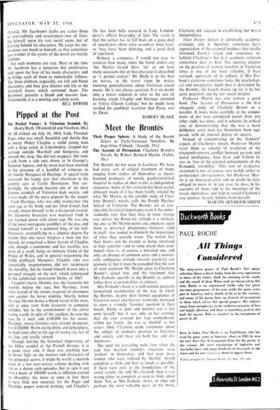Pipped at the Post
The Pocket Venus: A Victorian Scandal. By Henry Blyth. (Weidenfeld and Nicolson, 40s.) Ar 10 o'clock on July 16, 1864, Lady Florence Paget, who was small, beautiful and shortly due to marry Henry Chaplin, a stolid young man with a large estate in Lincolnshire, stopped her carriage outside Marshall and Snelgrove, and entered the shop. She did not reappear. She took a cab from a side exit, drove to St George's, Hanover Square, and by noon had been married in the presence of a handful of witnesses to the fourth Marquess of Hastings. A special train conveyed the happy pair that afternoon to his country seat at Castle Donington. Not sur- prisingly, the episode became one of the most famous scandals of Victorian high society, and it was made all the more piquant by the sequel.
Lord Hastings, who was only twenty-two (the same age as his bride and her jilted fiancé), had already shown himself to be a dissipated wastrel. His favourite breakfast was mackerel fried in gin, washed down with claret cup. He was one of the most outrageous gamblers of the day, and fancied himself as a potential king of the turf. Moreover, exemplifying to a singular degree the maxim that one never forgives a man one has injured, he conceived a bitter hatred of Chaplin, who, though a commoner and less wealthy, was more of a swell, being an intimate friend of the Prince of Wales, and in general outgunning the feeble profligate Marquess. Chaplin, who was remarkably magnanimous, did not reciprocate this hostility, but he found himself drawn into a personal struggle on the turf, which culminated in the celebrated snowstorm Derby of 1867.
Chaplin's horse, Hermit, was the favourite for months before the race, but Hastings, from sheer hatred of the owner, wagered an enormous sum against the horse winning. Shortly before the race Hermit broke a blood vessel in his nose, and at once went from favourite to complete outsider, but to the astonishment of the entire racing world, in spite of the accident, he won the race by a neck and £140,000 for his owner. Hastings, whose fortunes were already desperate, lost £130,000. Worn out by drink and debauchery, he died soon after at the age of twenty-six, last of his line and totally ruined.
Though lacking the historical importance of the Dilke scandal or the Parnell divorce, it is a good story and, if there was anything new to throw light on the motives and characters of the principal actors, it might be worth a shortish piece in a not over-serious volume dealing with ten or a dozen such episodes, but to spin it out into a book of 100,000 words is inflation carried to absurdity; the more so since in fact there is very little new material, for the Paget and Hastings papers contain nothing. and Chaplin's life has been fully covered in Lady London- derry's official biography of him. The result is that the author has to fall back on a great deal of speculation about what so-and-so 'must have' or 'may have' been thinking, and a great deal of repetition.
Without a computer, I would not care to estimate how many times the lower orders cry 'the Markis—Gawd bless 'im' or on how many occasions this or that character is described as 'a perfect cocker.' Mr Blyth is at his best on horses, at his worst when he makes knowing generalisations about Victorian sexual mores. He is not always accurate. It is no doubt only a minor solecism to refer to the seat of learning which Chaplin and Hastings attended as 'Christ Church College,' but he might have verified his confident assertion that Pusey was its Dean.
ROBERT BLAKE


































 Previous page
Previous page